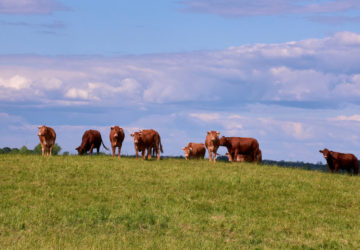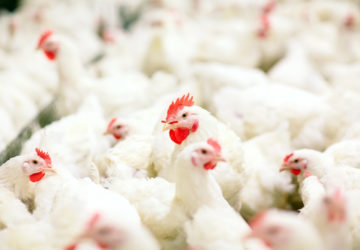Pamela Anderson must be floating on air right about now. As of this week, anti-meat activists have a new standard-bearer: United Nations chief climate expert and staunch vegetarian Rajendra Pachauri. On Monday, Pachauri basically put the UN seal on environmental vegetarianism when he recommended that everyone on Planet Earth begin cutting meat out of their diets to combat climate change. And vegan advocates can hardly contain their excitement. But PETA and company had better savor the flavor, because Pachauri’s rationale has already come under fire. And vegetarian groups are having a pretty tough time coming up with answers to some very relevant questions.
Take, for example, the ubiquitous UN statistic that livestock production is responsible for 18 percent of global greenhouse gas emissions. Now that Pachauri is using this stat as the foundation for his advice, some long-overdue questions about its accuracy have come to the fore. In an article that appeared in the British online magazine Spiked, Oxford University lecturer James Panton ran through a few of the main issues about the "18 percent" number:
[T]his figure is based upon calculating emissions from every aspect of the meat production process – not just animal flatulence, but deforestation to make room for grazing pastures, the production and transportation of fertilisers that are used in the production of animal feeds, the burning of fossil fuels in farm vehicles, and food transportation…
[A] third of that 18 per cent figure is drawn from estimates about the emissions caused by deforestation of the Amazon, which produces one per cent of the world’s beef. This means that the remainder of the world’s livestock production is responsible for around 12 per cent of greenhouse gas emissions.
Note that this "12 percent" is worldwide. Domestic assessments tell a much different story. Look at America’s livestock industry, and "12 percent" could go down as far as 2.4 percent. In the UK, methane emissions have actually decreased by 13 percent since 1990.
What would be the effects of adopting Pachauri’s recommendation? As Boris Johnson explained Tuesday in London’s Telegraph, cutting meat out of our diets would be disastrous for some of the world’s poorest people:
What [Pachauri] neglects in his argument are the 1.3 billion people whose livelihoods depend on agriculture, and above all he forgets the global population of human beings. It is our appetite for meat that supports those farmers…
And how would a global mandate for vegetarianism affect public health? Aren’t the nutritional benefits of meat the main reason why people have been eating it throughout our existence? As Miranda Devine pointed out in yesterday’s Sydney Morning Herald, scientific research confirms that there’s a good reason why we weren’t born with any spare stomachs:
University of New Mexico researchers, among others, have… stat[ed] that [our] prehistoric dietary shift to meat led to the unique qualities of human existence, including increased brain capacities, an extended juvenile period in which to furnish the brain, and a much longer lifespan.
The questions keep pouring in, but at the end of the day we’re left to consider the source. Is it the role of the UN to dispense dietary advice — even for environmental purposes? As Panton argues, Pachauri’s statement is a good indication that the UN’s Intergovernmental Panel on Climate Change is more political than practical. And the IPCC has crossed the line in telling us what we should and shouldn’t eat:
The proposal that we should all become (at least part-time) vegetarians is a political, not a scientific, question. The freedom to choose to eat meat when we please, and the tremendous improvements in the efficiency of livestock production that that freedom is based on, is a very good thing. It is the result of a society that is so economically productive and technologically efficient that meat can be produced cheaply. This stands in contrast to large areas of the under-developed world where poverty makes vegetarianism, to all intents and purposes, mandatory — especially where animals are needed to do work rather than provide food.




